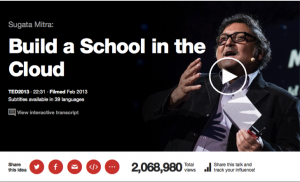The word “hacker” was first associated with the ne’er-do-well swagger of the word “pirate.” Hackers disrupted systems that should not be disrupted, after all. We made movies about them—young, disenfranchised punk geniuses huddled in basements, monkeying with our belovedly predictable institutions. Hackers compromised security! Hackers made the status quo vulnerable! Hackers were unwelcome party crashers during a time when our collective had become more reliant on the integrity of our digital networks than on the integrity of wood or steel.
But like pirates, the dark implications of the hacker have more recently taken on a more gallant and aspirational air. If we could separate the intent from the skills, what might we see? Ingenuity, for certain—and a chutzpah potent enough to make disruption not only fashionable, but ordered from the top down.
We are now in the second machine age: a great leap that has brought with it a constantly-unfolding change so profound (like the steam engines and assembly lines of the first machine age) that we still can’t fully grasp its effects. What we do know, however, is that those among us with a hacker’s mindset—that curious, try-anything, question-everything affinity for turning the status quo inside-out and backwards—are ahead of everyone else. Here’s why.
1. Chaotic growth requires leaders comfortable with chaos.
The Internet is the first thing that humanity has built that humanity doesn’t understand. It is the largest experiment in anarchy that we have ever had.
— Eric Schmidt
In their brilliant book The Second Machine Age: Work, Progress and Prosperity in a Time of Brilliant Technologies, Erik Brynjolfsson and Andrew McAfee consider digitization as an engine of progress. They buy into Carlo’s Cipolla’s idea that economic history is a balance sheet of the power at man’s disposal. In an age where our mass computer power per dollar doubles every 18 months—and that computer power represents the pivot point of bounty and freedom—is it the non-imaginative, change-averse thinkers who will surf the wave instead of get thrashed by it? Are we equipping this generation with the swagger they need to ride it well?

Brynjolfsson and McAfee would say no, but they also call themselves “mindful optimists.” Which means there’s a course of action. In an interview with Smart Planet, they bring our attention to the way in which individuals, governments, and businesses responded to the steam and factories of the first machine age—with vigor. Keen to populate with those who would excel in this newly mechanized context, the American government devised compulsory universal education. When the economy switched to mechanized jobs, the ninety percent of Americans who used to work on farms (now, it’s down to two percent) were not set adrift to a fate of unemployment. They were re-skilled.
“We believe that if we take the right actions—including reinventing education, fostering entrepreneurship, and readjusting the tax code—we can harness the benefits of this second machine age…” says Brynjolfsson.
2. The competitive landscape tilts in favour of people who have excelled *despite* being herded through the education system—not in favour of those who think and act as they were taught.
To create an organization that’s adaptable and innovative, people need the freedom to challenge precedents, to ‘waste’ time, to go outside of channels, to experiment, to take risks and to follow their passions.
— Gary Hamel
TED prizewinner Sugata Mitra describes the second machine age as a global computer made of people. These days, the personal skills and tools of individuals add up to the whole—and the RAM that powers positive change, he says, is creative curiosity. The educational system that exists now was devised centuries ago, with an agenda for studying and memorization. The digital age—which is fuelled by social collaboration—needs a self-directed system to flourish. Yet American researchers have discovered that over any given 4-year degree program, college students make little advancements in critical thinking, written communication, problem-solving and analytical reasoning. They’re still studying and memorizing, perhaps.

“It’s quite fashionable to say that the educational system is broken. It’s not broken,” says Mitra. “It’s wonderfully constructed. It’s just that we don’t need it anymore. Go to a job interview and tell and employer that you can recite the 17 times table—they don’t care. Why are we still teaching it?”
It’s somewhat of a paradox, but forward-thinking academics and educators such as Mitra are grappling with it—how can we, in an institutionalized system, teach our youth to break free of institutions and ‘unlearn’ to the point where they can be hackers?
Grapple on.
3. Hackers are tapped into playfulness. Play makes solutions.
There are children playing in the streets who could solve some of my top problems in physics, because they have modes of sensory perception that I lost long ago.
— J. Robert Oppenheimer
The health of a society should be measured by the health of its play. So says The Altarum Institute, in The Play Deficit by Danielle Marshall—who affords unstructured play the same educational premium as math and reading.
In her Live Science article, Are Today’s Youth Less Creative & Imaginative?, Rachael Rettner peels back layers of how “the system” suppresses the innate creativity and playfulness of children—creating a massive shortfall in this creativity-driven world they will enter as adults. She cites a 2010 study by Kyung Hee Kim, a creativity researcher at the College of William and Mary, who compiled 300,000 creativity tests dating back to the 1970s. She concluded that creativity has decreased among American children in recent years, with children becoming less able to produce unique and unusual ideas.
This is why hackers are pirates. Kids (and adults) with a hacker spirit push back against homogenous thought with divergent thought. But the good news? The maker movement—or a hacker-friendly, play-based education—counteracts the negative effects that school and our society have had on children’s’ playfulness, creativity, and critical thinking. We can get it back. Kim, Rettner, Miytra, and all of us at Beyond represent a groundswell of academic action.
It’s a swagger revolution of jerry-rigging, digressions from the expected, and foolish notions. Join us, won’t you?
 Watch Beyond CEO Lital Marom speak at PechaKucha Vancouver about how hacking can foster children’s’ creative confidence and help them move beyond limiting narratives for a bright, re-engineered future. Follow along by subscribing to Beyond’s Facebook page. If you’re an educator or developer interested in creating new frameworks for learning creativity, join the Beyond community of co-creators. Contact us at <email>.
Watch Beyond CEO Lital Marom speak at PechaKucha Vancouver about how hacking can foster children’s’ creative confidence and help them move beyond limiting narratives for a bright, re-engineered future. Follow along by subscribing to Beyond’s Facebook page. If you’re an educator or developer interested in creating new frameworks for learning creativity, join the Beyond community of co-creators. Contact us at <email>.




